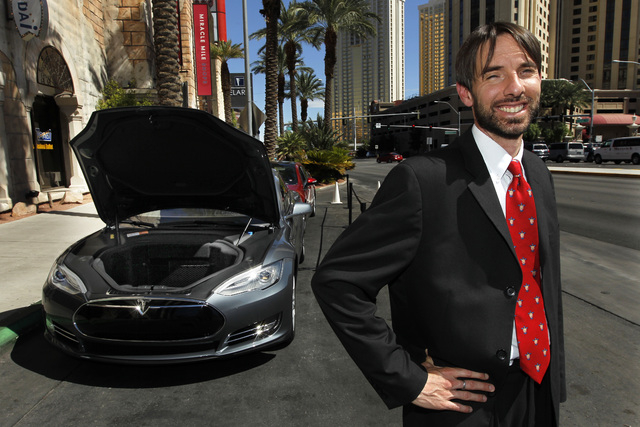Electric car report: Nevada needs to do more



CARSON CITY — Landing the Tesla Gigafactory was a huge economic victory for Nevada by most accounts, but the state needs to do much more at the end point of production to promote electrical vehicle use, according to a report by a nonprofit group promoting energy efficiency.
Without several policy changes, the state will stall in electrical vehicle use, according to the report issued recently by the Southwest Energy Efficiency Project.
“Nevada does not yet have the policy infrastructure to support mass deployment of electric vehicles,” said Mike Salisbury, author of the report, “Economic and Air Quality Benefits of Electric Vehicles in Nevada,” which includes state policy recommendations. “Several state policies that have proven themselves in other states are needed in Nevada.”
The report calls for state electrical vehicle (EV) policies that provide rebates for the purchase or lease of an electric vehicle, deregulate utility electricity sales so that charging stations can sell electricity as a fuel, update Nevada codes to allow local governments to finance fleet purchases of the vehicles from fuel savings and charge an EV registration fee to support road maintenance and charging stations.
Most of the recommendations would require action by the Legislature.
“We hope to get the conversation started with this report,” Salisbury said. “There is a lot of potential to push the market forward in Nevada.”
The Southwest Energy Efficiency Project is a public interest organization dedicated to advancing energy efficiency in Arizona, Colorado, Nevada, New Mexico, Utah and Wyoming.
The vehicles at the focus of the report are not just Teslas but run the gamut from the Toyota Prius plug-in with an 11-mile electric range and the Chevy Volt with a 40-mile range, both with gas engines, to the all-electric Nissan LEAF.
These cars make up only a tiny fraction of the Nevada car market. In 2012, the percentage of such new car registrations was 0.24 percent, rising to 0.37 percent in 2013, according to the report.
Charging stations for the vehicles are found primarily in the Las Vegas and Reno areas of Nevada, but there are some located along rural sections of Interstate 80.
Las Vegas has several dozen such stations, with many located along the Strip at major hotels.
Tesla Chairman and CEO Elon Musk said when Nevada was selected for the $5 billion battery plant that the project is key to the company’s ability to produce an affordable mass-market, all-electric vehicle within the next three years.
The Nevada Legislature recently approved up to $1.3 billion in tax incentives for the Tesla battery plant to be constructed in Storey County in Northern Nevada.
But building them is one thing. Selling them to the public is another.
Assemblyman Andrew Martin, D-Las Vegas, a “proud owner” of a Chevy Volt, said he would want to know what issue would be addressed by supporting tax incentives to buy an electric car before he could take a position on such a policy.
“Do we have a pollution concern here worth using state resources to solve the problem?” he asked. “What problem are we trying to solve?”
Martin said he prefers the Volt because of the way it drives and because he doesn’t like the idea of buying gasoline made from oil exported from countries that don’t like the United States. But buying an electric vehicle is a personal choice, he said.
The one issue related to electric cars that has generated concern by Nevada policymakers is the lack of road tax revenue collected from such vehicles, Martin said. But whether the state needs to move to a “vehicle miles driven” approach to collecting taxes for roads remains in the discussion stages only at this point, he said.
Salisbury said there are solid reasons to support such an incentive.
They include not only cleaner air but also economic benefits if Nevada’s abundance of alternative energy resources are developed to help serve the electric car market, he said.
Nevada has adopted a few minor policies that help the electric car market, including not requiring an emissions test for the vehicles, but none that is groundbreaking, he said.
The state has also authorized the vehicles to use High Occupancy Vehicle lanes, but the state Department of Transportation has not yet implemented such a policy, he said.
SWEEP also has published “Policies to Promote Electric Vehicles in the Southwest: A State Government Report Card,” which graded Southwestern state governments on how much they had done to support electric vehicles. Nevada received a C, having adopted only six policies that support their purchase.
Included in the Tesla deal, however, is legislation that will allow the company to sell its vehicles without a franchise agreement, which could make it easier for consumers to purchase the cars in Nevada.
Colorado, the state receiving the highest grade of an A, had adopted 12 policies supporting electric vehicles, including both a tax credit of up to $6,000 for the purchase or lease of one as well as an infrastructure fund paid for with an annual fee on each vehicle to invest in a network of charging stations.
Utah, which received the second-highest grade of a B+, has adopted a $1,500 tax credit for the purchase or lease of an electric vehicle.
Not surprisingly, Colorado and Utah have the highest penetration of electric car use, with new registrations reaching 0.62 percent in Colorado and 0.45 percent in Utah in 2013, according to the report.
Martin, who said he can travel about 40 miles on a charge in his Volt, said the market share of such vehicles remains small.
The electric vehicle industry is still in its infancy, he said.
Contact Capital Bureau reporter Sean Whaley at swhaley@reviewjournal.com or 775-687-3900. Find him on Twitter: @seanw801.












